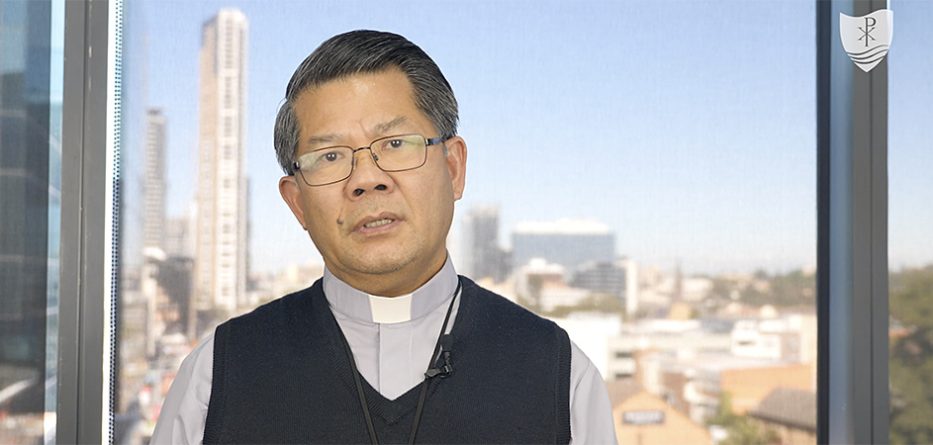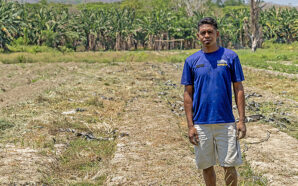Why the Australian Christian community needs to act ahead of COP26
Most Reverend Vincent Long Van Nguyen OFM Conv DD STL, Bishop of Parramatta
Given at the webinar: ‘COP26, Climate & the Pacific – A Call to Action’ organised by the Edmund Rice Centre
17 September 2021
The effects of climate change are everywhere for us to see. The consensus is almost universal that it is caused by human activities, unless you are a kind of Rip Van Winkle who has slept through decades of research by climate scientists; or unless you have chosen to live in the world of alternative facts, which many unfortunately do as the pandemic has shown.
The Australian Bishops’ Social Justice Statement this year calls fellow Catholics to listen to the signs of the times with open hearts. Listening to our farming communities across the nation, we would know that fires, floods, and droughts have become less predictable and more intense. Listening to our indigenous people, we would be aware that the ecological crisis is particularly painful because of their deep connection to country. Along with the cry of the earth and the cry of the poor, we also hear a cry of the young. They see their future being threatened, and want change, as a matter of intergenerational justice.
Australia’s Pacific neighbours are among some of the worst countries impacted by climate change. Kiribati, for example, is only about 2 meters above sea level, and failure on climate action could pose an existential threat to its inhabitants and other low-lying Pacific islands. Entire communities and their ancient heritage could be destroyed in a matter of a decade or so.
We cannot go on living the way we have. We cannot continue to destroy rain forests, pollute the environment and burn fossil fuels without dire consequences.
Scientists predicted long ago that extreme weather events would happen if carbon emissions were not reduced. These predictions had come to pass with devastating effects such as the bushfires that ravaged eastern Australia less than 2 years ago.
During this coronavirus pandemic, political leaders everywhere by and large have followed the advice of scientists in enacting public health policies that prevent or at least contain the spread of the virus and protect life. Unfortunately, there has not been a strong and decisive leadership when it comes to fighting climate change. Instead of uniting behind the science and enacting favourable public policies, many leading industrial nations including Australia have regressed or even reneged on the Paris climate accord which limits global warming to 1.5° C above the long-term average to reduce the worst impacts of climate change.
The policy directions in relation to cutting carbon emissions that our government has chosen in recent times go against the signs of the times, international agreements, the advice of scientists and even emergency services chiefs. Australia’s current climate policies are viewed globally as among the worst in the world. Our Prime Minister has flatly refused to commit to a legislated net-zero emissions target even when most of our major trading partners have done so. Therefore, Australia will effectively be abandoning the Paris agreement unless it makes at least a 50% cut in greenhouse gas emissions by 2030 and reaches net zero well before 2050, according to an analysis by policymakers and scientists.
As a nation, we cannot claim to be a responsible global citizen in addressing the moral challenge of our age while we lag behind other nations on climate action and continue to subsidize old polluting industries. It is true that we are only responsible for a comparatively small amount of carbon emissions. But it is no reason not to act and to show leadership. Australia has always prided itself on punching above its own weight. As Sir David Attenborough remarked that we are the keepers of an extraordinary section of the surface of this planet, including the Great Barrier Reef, and what we say, what we do, really matters.
As Australia and most countries prepare their post-COVID-19 economic recovery, it is crucial that we don’t dig ourselves out of one crisis only to exacerbate another. Scientists are quietly confident that they will be able to develop a vaccine for coronavirus. Unfortunately, the climate crisis that threatens to wipe out small Pacific nations cannot be addressed with a vaccine.
We need a radical new way of living that brings harmony and sustainability to all of life. Even if and when we get back to “normal”, we need to think and act differently; we need to rewire ourselves to be in communion with one another as a human family and as part of nature.
We need to abandon the old paradigm of competition, of survival of the fittest that undergirds much of our consumerist, capitalist economic system of buying life at any cost. We will perish under these conditions unless we return to the roots of nature and rewire ourselves to be part of nature. We need to have a conversion of mind and heart that leads to a conversion of lifestyle.
Each of us can begin to live life simply and poorly. Australia is the largest exporter of coal. But individually, we are responsible for producing a huge amount of greenhouse gases. We have one of the highest per capita emissions of carbon dioxide in the world.
We simply cannot leave the greenhouse problem to the big players like governments, energy companies, industry leaders and the like. There are practical measures that we all can do reduce our carbon footprint. Invest in renewable energy; divest from fossil fuels; consume less and waste less must be the way for us Christians to give new expressions to the first beatitude: to live the spirit of poverty and simplicity.
Pope Francis often speaks of the culture of globalized indifference. Australians and Christian Australians, in particular, need to build a broad coalition gathering around what is variously described as the moral challenge of our time in order to give a counter-witness to the political inertia, the vested interest of the industrial complex and general apathy. We need to amplify the prophetic voice of Pope Francis. It will reverberate through our parishes, schools, communities and to the broader society. It will inspire what I call a new “Laudato Si’ generation” and together we can bring the urgent message of reconciliation and healing for our broken earth.
The above-mentioned statement says: “When it comes to human knowledge of the lands and waters now known as Australia, the Aboriginal and Torres Strait Islander peoples are our first teachers. We need to learn how to listen more attentively to them.” They, for example, see the land and country in terms of a sacred relationship of interdependence and reciprocity within the diverse webs of life. Now is the time for us to learn from our indigenous wisdom of giving back to the land what it needs for regeneration, instead of endless extraction.
Today we are just beginning to appreciate this ancient wisdom more and more. Whereas our commodity-driven culture seeks to extract things from the land and country, our indigenous brothers and sisters acknowledge and celebrate the radical interdependence and reciprocity within diverse webs of life. It is they who teach us the importance of safeguarding Mother Earth’s delicate balance and the healthy conditions for life to flourish.
Sadly, that delicate balance is at the point of collapse. We are facing an ecological crisis and the message of Laudato Si could not have been more poignant. Pope Francis wants the whole Church globally to act with a greater sense of urgency.
Laudato Si’ provides us with this new direction which centres on the strengthening of relational wholeness of everything and everyone. As a result, all our efforts must be at the service of fellow human beings and the environment. “A technological and economic development which does not leave in its wake a better world and an integrally higher quality of life cannot be considered progress.” (LS 194).
Francis recognizes that the contradiction between economic growth and the Earth’s ecological balance cannot be considered progress because too often people’s quality of life actually diminishes — by the deterioration of the environment, the low quality of food or the depletion of resources — in the midst of economic growth. He further argues that we can’t pursue capitalist or even “green” growth and simultaneously reverse the breakdown of the ecological commons.
We must learn that ‘less is more’. We must learn to envision a new economy that shifts away from consumption and exploitation to one that celebrates radical interdependence and reciprocity within diverse webs of life. Only by taking less from the earth can we move to an alternative model of living in radical harmony and deep connection with the planet.
This new consciousness and way of living opens new possibilities. It moves us from scarcity to abundance, from extraction to regeneration, from dominion to reciprocity, from ruthless exploitation to responsible stewardship and from loneliness and separation to connection with all that is around us.
Guided by the gospel message of the new kingdom at hand, and open to a world of change, the Church can live up to its prophetic call to be a beacon of hope for humanity. We can be an alternative relational paradigm for those on the margins, where the poor and the forgotten can be brought into a new unity; a Church that advocates life at all costs and promotes peaceful life in a war-torn and violent world; a Church that models justice in an age of greed, consumerism, and power; a Church centered on the risen Christ, empowering a consciousness of the whole.
May the example of St Mary McKillop inspire us to embody the kingdom vision of Jesus and become a lighthouse for the world. In the words of Pope Francis, if we want a different world, we must become a different people. May our effort to change the trajectory of the ecological crisis and align the future of our planet to God’s intention be brought to fruition.
RELATED: Church leaders call for justice on climate change in the Pacific








